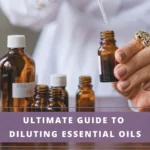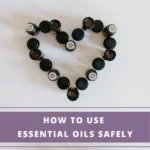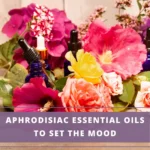As an Amazon Associate I earn from qualifying purchases. See Full Disclosure Here
Using essential oils for seasonal allergies offers a mild yet effective way to alleviate the annoying symptoms without causing any side effects.
Seasonal allergies can be a frustrating and uncomfortable experience. The persistent sneezing, itching, and congestion can make it difficult to enjoy the beauty of the outdoors or even just your own home.
There are several ways you can manage seasonal allergy symptoms naturally. Essential oils and blends are among these natural measures.
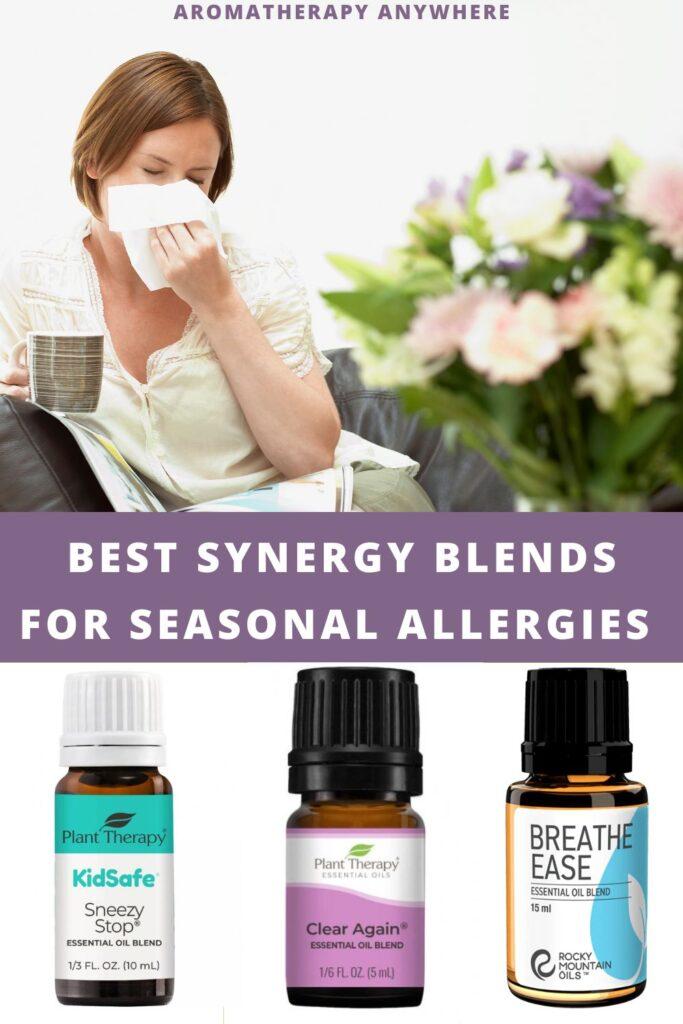 Essential oils offer an effective and safe way to reduce sensitivity to seasonal allergens, manage allergy symptoms, and get some relief.
Essential oils offer an effective and safe way to reduce sensitivity to seasonal allergens, manage allergy symptoms, and get some relief.
Before diving into the best essential oils for seasonal allergies, here are a few things you should know about what causes allergies and how essential oils can help.
What Causes Seasonal Allergies?
Seasonal allergies are caused by excessive amounts of allergens in the air. There is a difference between spring and fall allergies.
Spring allergies are due to the abundance of pollen in the air. Fall allergies are caused mainly due to ragweed.
Only those who are sensitive to the allergen – either pollen or ragweed – will develop an allergic reaction when they come in contact with it. This allergic reaction is in fact a symptom of the immune system’s attempt to get rid of the intruding allergen.
When you breathe in air that contains airborne allergenbs, your immune system gets triggered and produces excessive mucus in the respiratory tract. This helps to stop the allergen from entering further into the nasal passage and through to the lungs.
Instead, the mucus accumulates in the respiratory tract resulting in congestion in the chest and that uncomfortable feeling of having phlegm stuck in your throat.
Learn more about what causes pollen allergy symptoms.
When we talk about essential oils and allergies, it is important to make sure you are using the right one for your specific type of allergy.
What I’m highlighting in this article are the best essential oils for seasonal allergies or pollen allergies.
How Essential Oils Can Help Reduce Seasonal Allergy Symptoms
The best essential oils for allergies are those that have immune-boosting and anti-inflammatory properties. These oils work by boosting the immune system so it is less susceptible to allergens and helping the body fight inflammation, which is a major contributor to pollen allergy symptoms.
List Of Best Essential Oils For Seasonal Allergies
Clear Again Synergy Blend
Clear Again Synergy Blend from Plant Therapy is a powerful and refreshing blend of essential oils, formulated to support respiratory health and clear breathing, especially during times of high seasonal pollen.
This blend includes a combination of 100% Lavender, Helichrysum, Niaouli, Roman Chamomile, and German Chamomile essential oils. These oils work together to help open airways, soothe congestion, and promote easy breathing.
Whether used in a diffuser or applied topically, Clear Again can provide a revitalizing and invigorating aromatherapy experience. It’s perfect for anyone seeking relief from seasonal allergies and congestion.
Breathe Ease Essential Oil Blend
Breathe Ease Essential Oil Blend from Rocky Mountain Oils contains a unique combination of respiratory-boosting oils.
The oils work together to boost your body’s ability to break up mucus or phlegm caused by pollen allergies. Its soothing menthol aroma can calm your respiratory system and make it easier to get full, deep breaths.
Sneezy Stop KidSafe Essential Oil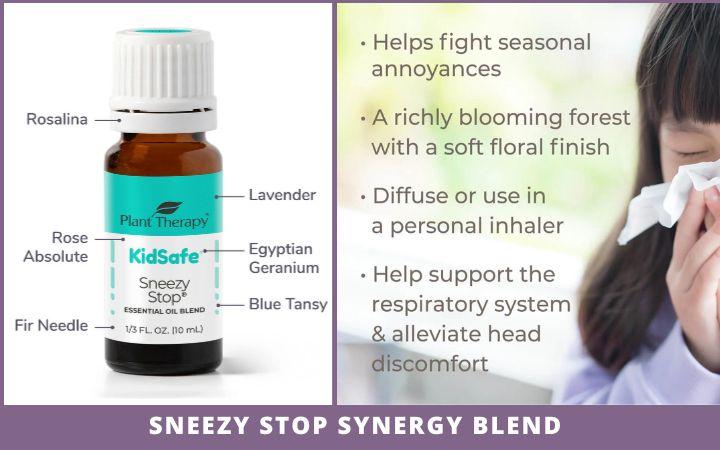
Plant Therapy’s Sneezy Stop KidSafe Essential Oil is a gentle and effective blend formulated specifically to support respiratory health in children.
This blend includes Fir Needle, Rosalina, Lavender, Blue Tansy, Rose Absolute, and Egyptian Geranium essential oils, which work together to help soothe respiratory discomfort and support the immune system.
Sneezy Stop can be used in a diffuser or applied topically to help alleviate symptoms of seasonal allergies, colds, and congestion.
With its KidSafe formulation, this essential oil is safe for children ages 2-10. As always, please talk to your child’s pediatrician first.
Peppermint
Peppermint essential oil is known for its anti-inflammatory, decongestant, and antispasmodic properties, making it a great option for allergy sufferers. All of these properties work together to inhibit those contractions that trigger coughing spells.
Using peppermint oils relieves nasal congestion, coughing, and other respiratory symptoms associated with allergies.
Peppermint is also my No.1 recommended oil for allergy-prone travelers as it is versatile and can be used for several other purposes.
Lemon
Lemon essential oil is a natural antihistamine and can help relieve allergy symptoms such as congestion and coughing.
It is also an effective air purifier and can help eliminate allergens from your home. To use lemon oil to get rid of airborne allergens, add a few drops to a diffuser or mix it with water in a spray bottle to use as a natural air freshener.
Lemon essential oil is also a safe and effective natural cleaning agent. To disinfect the kitchen, bedroom and bathroom and get rid of allergens, wipe the surfaces with a towel dampened with water to which a few drops of lemon oil are added.
Eucalyptus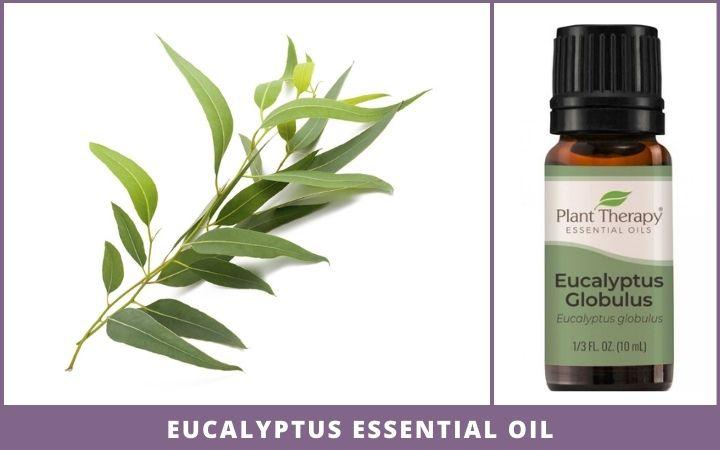
Eucalyptus essential oil contains citronellal, which has proven analgesic and anti-inflammatory properties. Inhaling the vapors of eucalyptus can open up the lungs and sinuses, improving circulation and reducing allergy symptoms.
Eucalyptus oil is also an effective expectorant, helping the body to get rid of toxins and other harmful microorganisms that act as allergens. If you’re highly susceptible to seasonal allergies, consider carrying a bottle of eucalyptus essential oil with you at all times so you’re always protected no matter where you are.
The best way to use eucalyptus essential oil to relieve congestion caused by allergies is by creating a steam bath. To do this, add a few drops of eucalyptus oil to a bowl of steaming hot water. Form a tent with a large towel to prevent the steam and aromas from escaping. Breathe in deeply. The warm eucalyptus aromas will clear your congestion and provide relief from your allergy symptoms.
Tea Tree Oil
Tea tree essential oil is a natural antihistamine and anti-inflammatory, making it a great option for allergy sufferers.
It also has strong antimicrobial activity against several strains of microbes that cause our immune system to work on overdrive resulting in inflammation.
This antimicrobial property of tea tree oil gives it the ability to kill airborne pathogens that are responsible for causing allergies.
Chamomile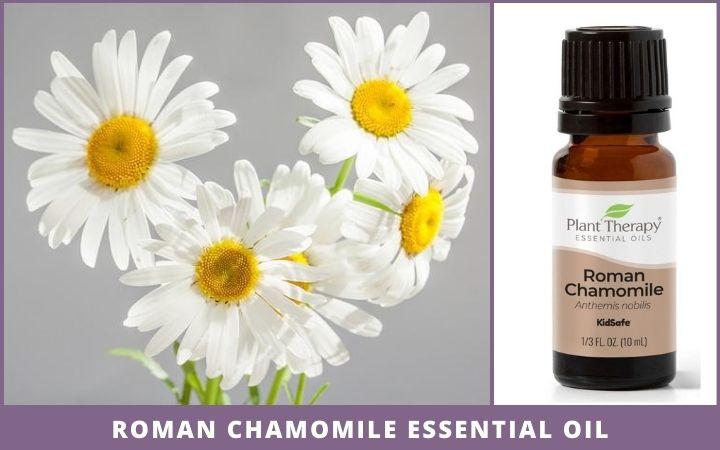
Known for its excellent calming and soothing properties, Chamomile essential oil is a great choice for reducing allergy symptoms.
Its relaxing properties also make it a great choice for soothing inflamed and irritated nasal passageways.
Basil
Basil essential oil works by reducing the body’s inflammatory response to allergens and calms the body down so that the reactions are not as severe.
Studies have shown that basil oil has antimicrobial properties and can eliminate allergens that cause asthma and respiratory damage. It’s also an antispasmodic oil that can treat coughing symptoms and an analgesic, which provides relief from pain.
Lavender
Lavender essential oil is known for its relaxing and anti-inflammatory properties, which can help alleviate multiple allergy symptoms.
It is also a natural antihistamine, which can help reduce allergic reactions. In addition, inhaling the aroma of lavender will help you stay more relaxed, lowering your sensitivity to external stressors.
Helichrysum
Helichrysum essential oil promotes healing and soothes inflammation that typically results from bacterial and microbial infections. This makes it very effective for use in soothing skin-related allergic reactions.
It is also great for use in calming respiratory distress that results from sensitivity to airborne allergens.
When inhaled, the Helichrysum aroma reduces congestion and coughing by clearing away the excess mucus accumulated in the respiratory tract.
When using essential oils for allergies, it’s important to remember that they should be used in moderation and with caution. And always seek advice from a healthcare professional if you have any concerns or questions.
How To Use Essential Oils For Seasonal Allergies
There are several ways to use essential oils for seasonal allergies
– Add a few drops to your diffuser and inhale the aroma of the oil
– Use essential oils in your bath or in the shower
– Add a few drops of eucalyptus or peppermint essential oil to a bowl of hot water and inhale the steam to ease congestion
– Before applying any essential oil topically, make sure to dilute the oil with a carrier oil first. Never apply any essential oil directly to the skin in its concentrated form
– Pack a portable diffuser when traveling to get the allergy-reducing benefits of essential oils when traveling
25 more ways to use essential oils for seasonal allergies without a diffuser
Related Reads:
Natural Ways To Reduce Seasonal Allergies
How To Use A Neti Pot For Seasonal Allergies & Sinus Infection
What Is A Neti Pot & How to Use It
17 Easy Ways To Allergy-Proof Your Home Against Pollen
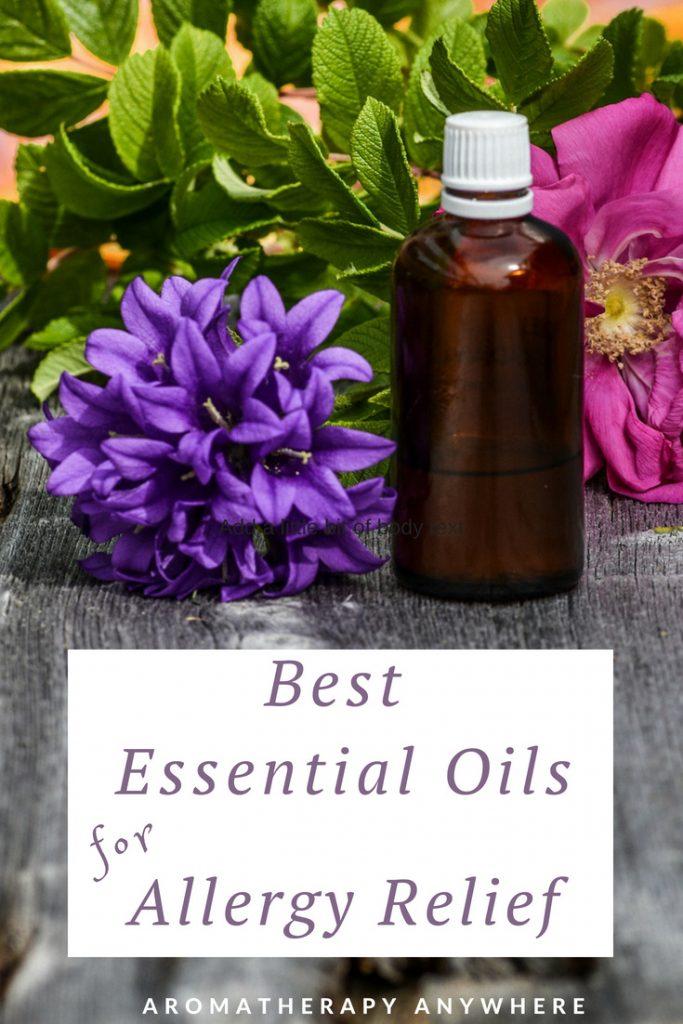
Disclaimer: This information is not intended to serve as medical advice. Please consult your physician before using essential oils. See Full Disclaimer here.





